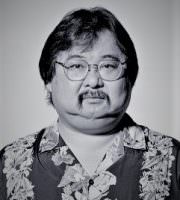by Garrett Hongo
In Chicago, it is snowing softly
and a man has just done his wash for the week.
He steps into the twilight of early evening,
carrying a wrinkled shopping bag
full of neatly folded clothes,
and, for a moment, enjoys
the feel of warm laundry and crinkled paper,
flannellike against his gloveless hands.
There’s a Rembrandt glow on his face,
a triangle of orange in the hollow of his cheek
as a last flash of sunset
blazes the storefronts and lit windows of the street.
He is Asian, Thai or Vietnamese,
and very skinny, dressed as one of the poor
in rumpled suit pants and a plaid mackinaw,
dingy and too large.
He negotiates the slick of ice
on the sidewalk by his car,
opens the Fairlane’s back door,
leans to place the laundry in,
and turns, for an instant,
toward the flurry of footsteps
and cries of pedestrians
as a boy—that’s all he was—
backs from the corner package store
shooting a pistol, firing it,
once, at the dumbfounded man
who falls forward,
grabbing at his chest.
A few sounds escape from his mouth,
a babbling no one understands
as people surround him
bewildered at his speech.
The noises he makes are nothing to them.
The boy has gone, lost
in the light array of foot traffic
dappling the snow with fresh prints.
Tonight, I read about Descartes’
grand courage to doubt everything
except his own miraculous existence
and I feel so distinct
from the wounded man lying on the concrete
I am ashamed.
Let the night sky cover him as he dies.
Let the weaver girl cross the bridge of heaven
and take up his cold hands.
Last updated September 09, 2022




